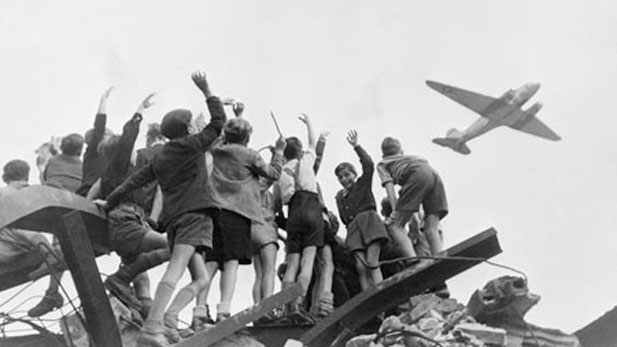
A group of German children stand atop building rubble, cheering a United States cargo plane as it flies over a western section of Berlin.
On June 24, 1948, the Cold War began in the war-torn, divided city of Berlin. The Soviets, who controlled all of East Germany and the eastern half of Berlin, blocked all access to the American- and British-controlled West Berlin, choking commerce and starving the people. The Soviet goal was to expel the Allied forces, who had long been a thorn in Stalin's side. But Western forces refused to abandon the city. President Truman proclaimed, "We stay in Berlin. Period." To do so would mean attempting the impossible: supplying two million civilians and 20,000 Allied soldiers with food and fuel - entirely from the air.
Previously, the roar of American and British planes overhead heralded death and destruction to the people of Berlin. Now, Allied troops were seen as angels of mercy, delivering powdered eggs and milk, flour, coffee and coal to the beleaguered city - more than 4,000 tons of life-saving supplies daily. The operation was masterminded by U.S. General William Turner, who during World War II had developed a daring scheme to supply anti-Communist forces in China.
After 11 months, the success of the mission was a continuing embarrassment to the Soviets and an overwhelming triumph for the Allied forces. President Truman, elected for a second term, emerged as the strong man of the Cold War. All told, the airlift delivered 1.7 million tons of essential food and fuel to the people of West Berlin.
See previews and find out more at pbs.org
Watch it Monday, November 10th at 9:00pm on KUAT6-HD

By submitting your comments, you hereby give AZPM the right to post your comments and potentially use them in any other form of media operated by this institution.